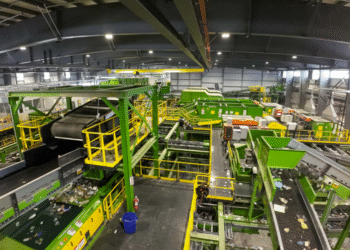Legislation making lithium-ion battery producers responsible for collecting and recycling the products they sell is advancing in California.
Assembly Bill 1509 establishes an extended producer responsibility (EPR) program for lithium-ion batteries and sets recycling rate targets for retailers selling products that contain these batteries.
The legislation passed an Assembly floor vote in May and is currently under consideration in the state Senate.
Lithium-ion batteries have received greater attention in recent years for the dangers they pose in e-scrap processing plants, where they can potentially ignite during device disassembly. In an EPA presentation last year, processors shared tips on avoiding fires when handling devices containing the batteries. One processor described lithium-ion batteries as “one of the biggest challenges that we have.”Last year, an amendment to the International Fire Code proposed new requirements for recycling facilities that handle lithium-ion batteries, in acknowledgement of the flammability hazards. The proposal was ultimately voted down.
The issue has also been featured in mainstream media reporting.
Besides the e-scrap industry, lithium-ion batteries pose major challenges for residential recycling operators. The California bill received support from Rethink Waste, also known as the South Bay Waste Management Authority, a San Mateo County materials recovery facility (MRF) operator that suffered a massive fire in 2016. The fire was caused by a lithium-ion battery placed in a curbside cart and transported to the MRF, where it sparked a flame that led to $8.5 million in damage.
Learn more in person
With batteries continuing to present handling, storage and management challenges, a session at the 2019 E-Scrap Conference and Trade Show will explore ways to mitigate risks and take advantage of battery recycling opportunities. The event is taking place Sept. 23-25 at the Hilton Orlando in Orlando, Fla. Go to the conference website to learn more and register.The bill “would help reduce the fire and safety risk these batteries pose by ensuring their proper disposal,” the MRF operator wrote. “Manufacturers and retailers must take more responsibility for the products they create if we are going to protect our workers, communities and waste management infrastructure from battery-related fires.”
The Consumer Technology Association, which represents electronics manufacturers, opposes the bill.
A version of this story appeared in Resource Recycling on July 30.































